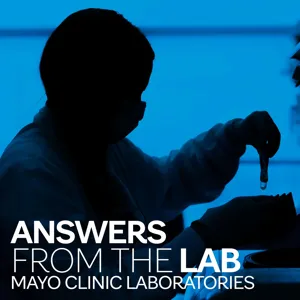Antibody against the GABA-A receptor is a biomarker of autoimmune encephalopathy that occurs across the lifespan, and disproportionately affects children. In this test-specific episode of the "Answers From the Lab" podcast, Andrew McKeon, M.B., B.Ch., M.D., explains how Mayo Clinic Laboratories' GABA-A receptor antibody assay aids diagnosis of this serious but treatable condition.
Show notes
(00:32)
Could you provide a little information on your role here at Mayo Clinic?
(01:11)
Can you give an introduction as to how GABA-A is important as the field of autoimmune neurology develops?
(02:15)
What type of methodology are we using in this assay?
(03:17)
Will there be a reflex to confirm positivity, or is that captured in that initial test?
(04:22)
Is either CSF or serum specimen preferable, or do we recommend both for this biomarker?
(05:09)
In combination with what phenotypes should this biomarker be considered?
(05:37)
Should a physician consider adding a GABA-A receptor standalone test to our encephalopathy, epilepsy, or pediatric evaluations, to be sure they're doing a comprehensive review?
(06:25)
Can you give us a little background on why this test is being launched by itself? Is Mayo Clinic Labs changing its stance on whether comprehensive evaluations are the most appropriate method?
(07:30)
Why has it taken so long to bring this assay live?
(08:14)
For exactly what type of patients should physicians consider this testing?
(10:21)
Should physicians add our encephalopathy evaluation every time they order GABA-A? Is the presentation you just described common or a subset?
(11:24)
Does that recommendation change in pediatric patients?
(12:20)
What does a positive result tell physicians?
(12:57)
Does GABA-A have a high-risk oncological association?
(13:18)
What does GABA-A tell a pediatric neurologist if the test comes back positive?
(14:14)
Should a positive GABA-A test lead a physician to a certain treatment option?
(15:24)
What are you most excited about in relation to the launch of this new test?
(16:48)
Is there anything else you'd like to add about this test?
